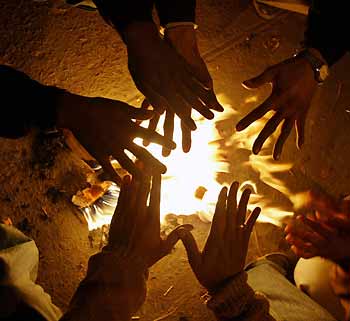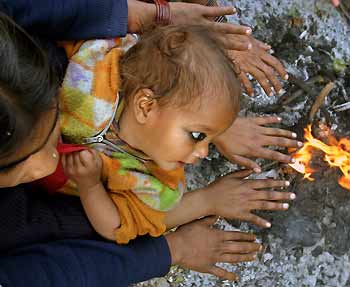|
Toll in South Asia cold wave tops 230
(AP)
Updated: 2006-01-10 15:36
Dense fog blanketed northern India on Tuesday, and civic authorities lit
bonfires in some cities to keep people from freezing as the death toll from a
cold wave in South Asia rose to more than 230 people, officials said.
Many of the deaths in India, Bangladesh and Pakistan came from exposure or
fevers and pneumonia contracted during the cold spell, officials said.

Indian vegetable sellers warm themselves near
a bonfire at a marketplace during a cold wave in New Delhi January 9,
2006. Reuters] | "Bonfires are the only solace for
us," said Sukhai Ram, 30, a laborer in the northern Indian city of Lucknow.
Wrapped in a filthy blanket, he had spent the night with dozens of others
huddled around a public bonfire. "Without the fires, we will die."
Bangladesh recorded the highest death toll overnight, with 14 people dying in
northern districts near the Himalayan foothills where temperatures dipped below
the average of 8 degree Celsius (46 degree Fahrenheit).
Nine of those deaths came in the impoverished northern district of
Thakurgaon, said relief officials who asked not to be identified because they
were not allowed to speak to media.

A homeless Indian migrant worker sits with her
child beside a bonfire by a road in the northern Indian city of Chandigarh
January 9, 2006.[Reuters] | Five other deaths were
reported in the neighboring districts of Dinajpur and Ishwardi, reported the
Bhorer Kagoj newspaper.
A total of 40 people have died in Bangladesh since the cold wave began about
a week ago.
Most Bangladeshi villagers live in mud-and-thatch huts and are ill-prepared
for colder-than-normal weather, and relief workers said they were handing out
blankets and warm clothes, as were authorities in stricken parts of neighboring
India.
In India's worst-hit Uttar Pradesh state, at least 12 people died overnight,
bringing India's death toll to 144, said Surendra Srivastava, a police spokesman
in Lucknow, the state capital.
Dilip Kumar, a 32-year-old construction worker in Lucknow, said his family
had "arranged for our own bonfire to keep warm at night. If we can't find wood
from scavenging, we burn rubber tubes to ward off the biting cold."
In the neighboring states of Punjab and Haryana, at least 15 people have died
because of the cold since November, while another eight deaths have been
reported over the last two weeks from the state of Jammu-Kashmir.
Schools have been ordered closed across northern India until the cold wave
lifts.
In neighboring Pakistan, at least 47 people have reportedly died of cold and
pneumonia from a week of frigid weather in the country's remote northern
Himalayan region.
The region is outside areas hit by a giant October 8 earthquake that killed
at least 87,000 people.
The World Health Organization last week reported 18 cold-related deaths in
the quake zone over the previous six weeks.
Anecdotal reports suggest many more may have died, although the deaths have
not been tallied by authorities, in part because some areas are inaccessible.
In Nepal, meanwhile, at least three people died Sunday from the cold in
Janakpur, 200 kilometers (125 miles) southeast of the capital, Katmandu, said
Umesh Pokhrel, a government official. He had no information on how many people
have died so far in the Himalayan kingdom.
The cold also left wide swaths of India and Bangladesh shrouded in dense fog,
disrupting road, rail and air traffic on Tuesday.
The meteorology departments in India and Bangladesh that the cold spell,
worsened by chilly northwesterly winds, would last until the end of the
week.
|